Comments
ERIC PREVEN’S NOTEBOOK - County Action vs. City Hearing--Four months after federal immigration raids sparked protests, a 30% drop in school attendance, and an estimated $275-million hit to California’s GDP, Los Angeles leaders are responding in starkly different ways.
On Tuesday, October 14, 2025, the Los Angeles County Board of Supervisors voted 4–1 to declare a local state of emergency, unlocking rent relief, legal aid, and potential eviction moratoriums for families reeling from ICE sweeps that the Department of Homeland Security reports have detained more than 5,000 people since June. Supervisors Lindsey Horvath and Janice Hahn co-authored the motion, framing it as a lifeline amid “widespread fear.”
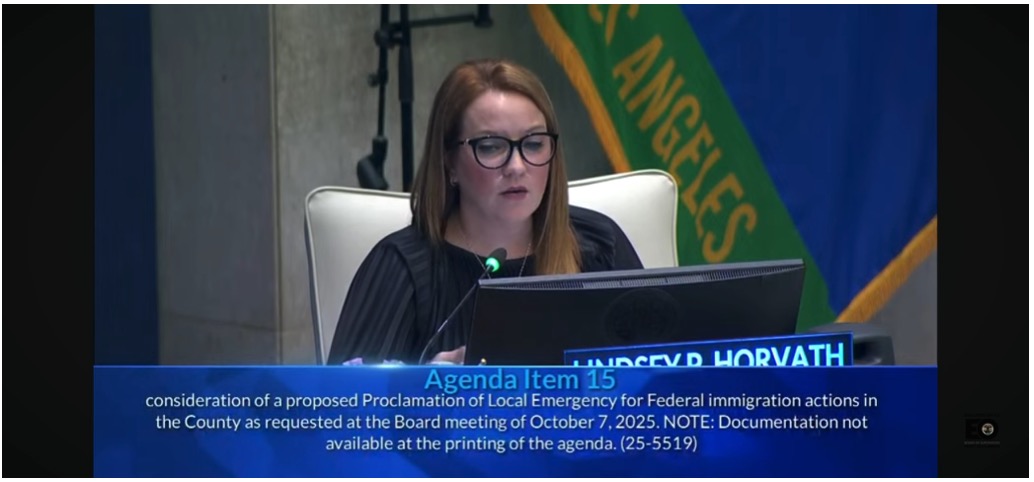
Change agent (gag) Lindsey P. Horvath.
The raids have strained schools, hospitals, and workplaces in a county where one-third of 10 million residents are foreign-born. Dissenting Supervisor Kathryn Barger warned of legal risks and burdens on landlords.
The next day, the Los Angeles City Council hosted a faith-leader presentation during its regular meeting. Clergy from Catholic parishes, synagogues, and the Saul Alinsky-inspired One LA–IAF shared raw accounts of raided workplaces, locked church gates, and self-deportations, with one speaker calling it a “hearing.” Unlike the County’s agendized process—with call-in testimony and clear public-comment windows—this segment wasn’t listed on the posted agenda, prompting concern from residents and open-government advocates about compliance with California’s Brown Act, which requires 72-hour notice for regular-meeting items.
The theological framing—invoking Torah commandments and papal teachings to condemn what one priest called “dystopian” raids—moved many listeners but unsettled others, given the lack of prior notice or opportunity for public response. One LA–IAF also spotlighted its “Freedom Schools,” rights workshops that have trained more than 1,000 Angelenos since July 4.
The human toll—shattered families, rattled economies—is undeniable. Yet the procedural contrast stings: one body acted transparently; the other amplified testimony in a vacuum.
What follows is the full transcript of that City Council presentation—a poignant, if procedurally imperfect, snapshot of faith-fueled resistance. [Read the verbatim comments link]
Transcript: Councilmembers’ Dialogue During “Faith-Based Discussion”
(00:38:28 – 01:20:24 ≈ 42 minutes total)
Council President Harris-Dawson: We, members, you know, we committed some time ago to having a platform for residents of our city, business owners, organization leaders, to be able to share with us what's happening on the ground in our city with regard to the so-called immigration enforcement actions from the federal government. And so this morning I'm very happy that CD 5 has organized a good discussion for us that we will begin at this moment. Councilmember Yaroslavsky.
Councilmember Katy Yaroslavsky: Thank you, Council President. Good morning, everyone. Over the past few months we’ve all been deeply moved by testimony from immigrant-rights groups … Today we’re going to hear from faith leaders … I also want to thank Janet Hirsch and 1LA IAF for helping to organize today’s presentation. With that, I’d like to introduce 1LA’s lead organizer, Robert Hu.
[Robert Hu – 1LA IAF ≈ 3 min 25 sec]
[Father Joey Evangelista – Precious Blood & St. Kevin Parishes ≈ 7 min]
[Rabbi Dara Frimmer – Temple Isaiah ≈ 11 min 30 sec]
[Sheila Thomas – Holy Name of Jesus Catholic Church ≈ 6 min 30 sec]
[Robert Hu – Closing remarks ≈ 45 sec]
Council President Harris-Dawson: Thank you so much. To all of you, let’s give them another big round of applause for stepping up. Councilmember Yaroslavsky.
Councilmember Yaroslavsky: Thank you so much to the four of you for being here and for the work you do every day on behalf of your communities. I'd like to invite Councilwoman Hernandez — I believe you wanted to say a few words. Sheila Thomas’s church is in CD 1, so we’ll start with you. Thank you.
Councilmember Eunisses Hernandez: Thank you, Councilwoman Yaroslavsky. I believe that one’s in CD 10 — yes? Sheila, right? You’re in CD 10? Yes. And Father, you’re in CD 1. And you’re 102 years old, right? The church has been serving Los Angeles — not you, you look great — for 102 years … I’d like to thank you all for organizing this with the city … Is it okay to ask a question or two? Thank you, Councilwoman.
Father, what do you say to those who claim to be people of faith while supporting policies that criminalize migration and separate parents from their children?
[Father Joey response ≈ 1 min 30 sec]
Councilmember Hernandez: And in this moment where it feels like — why is this happening, why has God allowed this — can you share some words for people looking to lean on their faith?
[Father Joey response ≈ 1 min 30 sec]
Council President Harris-Dawson: Thank you so much, Councilwoman. We have a couple more folks on the queue. Councilmember Nazarian, you’re on the queue.
Councilmember Adrin Nazarian: Can you please come back to me?
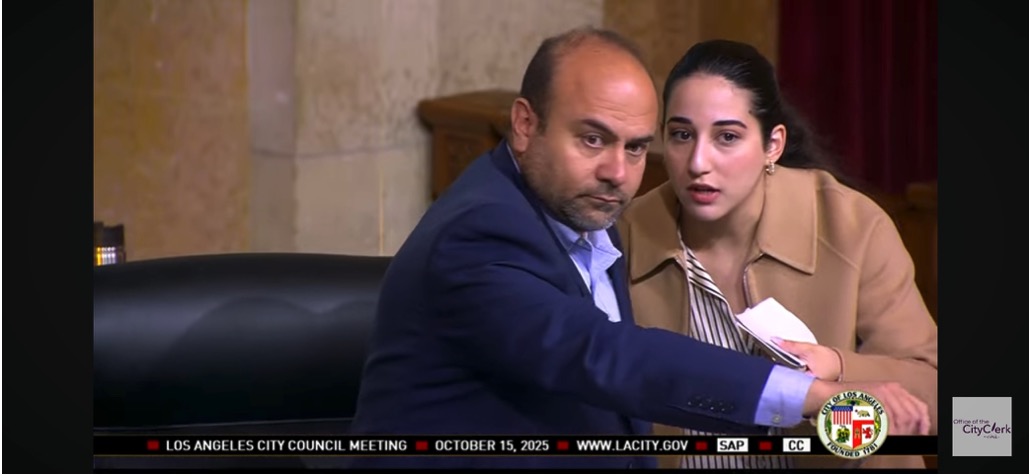
CD2 Adrin Nazarian, taking an audible and then never coming back.
Council President Harris-Dawson: All right, we’ll come back to you. Councilmember Hutt.
Councilmember Heather Hutt: Thank you, Mr. President, and thank you, Councilwoman Yaroslavsky, for bringing in our faith leaders that are so well connected to our community … I want to appreciate you for being a helpmate in this situation … I’ll get on the calendar so I can come to a Freedom School. Thank you again, Councilwoman Yaroslavsky, for reminding us where love and where God is. Thank you.
Council President Harris-Dawson: Thank you so much. Councilmember McOsker.
Councilmember Tim McOsker: Thank you so much, Councilmember Yaroslavsky, for bringing in these faith leaders. I just want to thank you for your testimony and your witness to a faith tradition that I share. I was born and raised Roman Catholic … We talked about Catholic social teaching … Your witness is what we call the Church of the Village as opposed to the Church of the Cathedral … The U.S. bishops are clear: people have a right to thrive in their land and a right to migrate; governments must treat people with dignity and respect; enforcement must be proportional. I hope for a billion Catholics on this planet it’s clear that we as a country are acting outside of Catholic teaching. Thank you so much for being here.
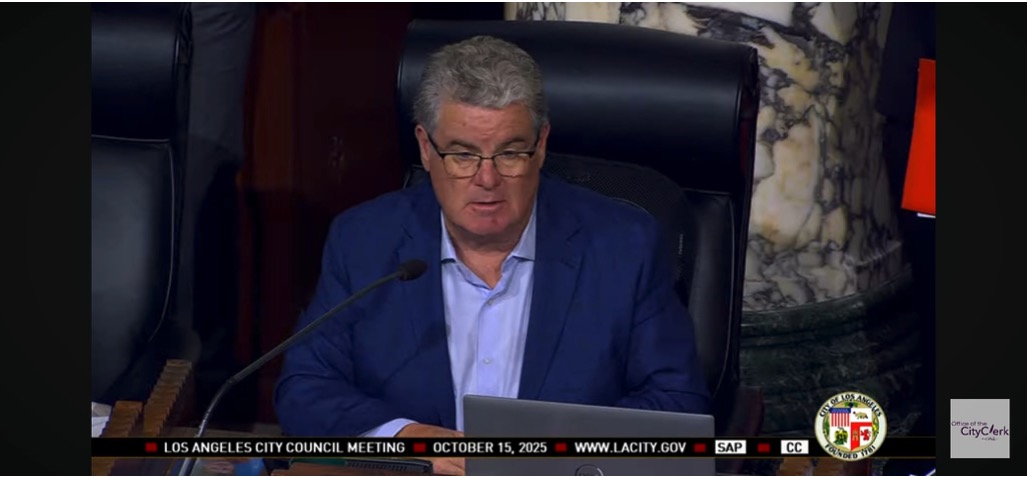
Rabbi Tim McCosker!
Council President Harris-Dawson: Thank you so much, members, and thank you, Councilmember Yaroslavsky. And thank you to all of you who shared with us today. I can’t help but give a special shout-out to Holy Name Catholic Church …
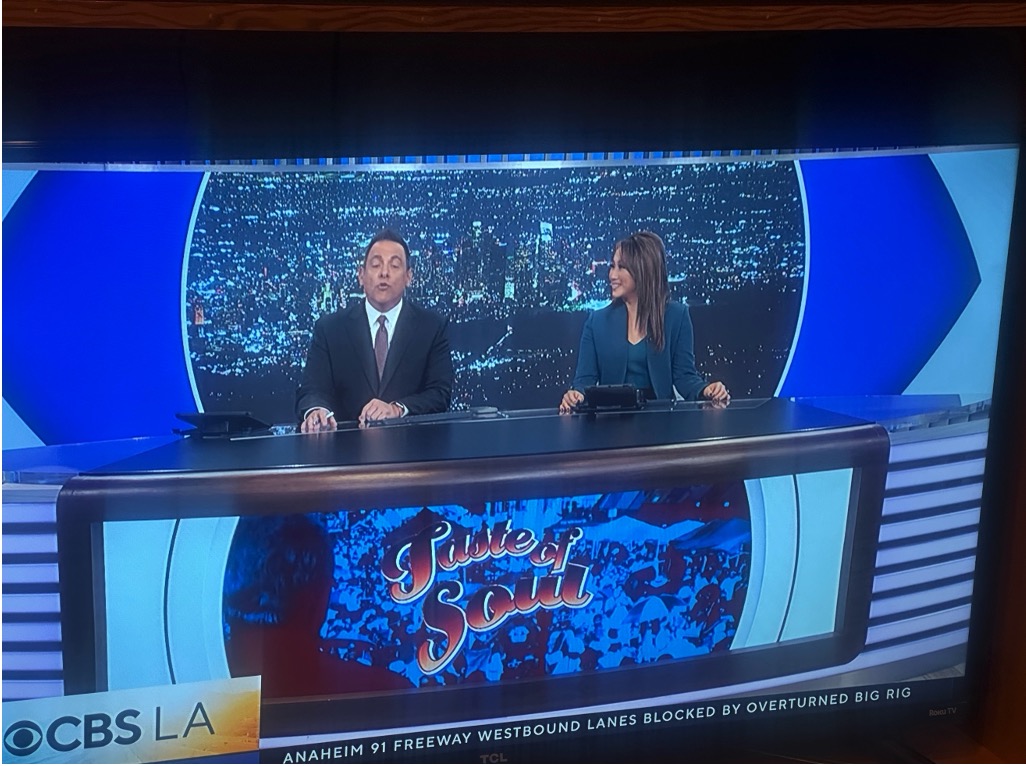
Taste of Soul and CBS LA hand in glove.
My family talked about migrating from Louisiana to Los Angeles and Holy Name being one of the places they could go … It’s heartening to see Holy Name continuing that tradition … making Los Angeles a holy hotspot in this country while we’re going through this difficult time. Thank you all so much. Councilmember Yaroslavsky — you’re good? All right. Thank you all so much.
Council President Harris-Dawson: Madam Clerk, which items are available for us to vote on at this time?
(Faith-based discussion segment ends; meeting proceeds to voting and public comment.)
Total running time: ≈ 42 minutes
An Empty Bag with a Hole in It
I listened to Yascha Mounk and Bret Stephens go at it on The Good Fight. Stephens, the New York Times conservative, argued that America still has “credible optimism” — the ability to regenerate after every political acid bath. Mounk, the philosopher of democracy, wanted structural reform and moral restraint. Fine ideas, but his version landed like philosophical oatmeal: not wrong, just … mushy.
Stephens was closer to something real. He believes in the system’s knack for self-correction, that America can still swerve before the guardrail. I want to believe him. But the truth is, there’s no well-lit path back to decency. We behave the way we do because the incentives all point to chaos. There is no single action — no ballot initiative, no civility training, no media reform — that fixes the way we behave.
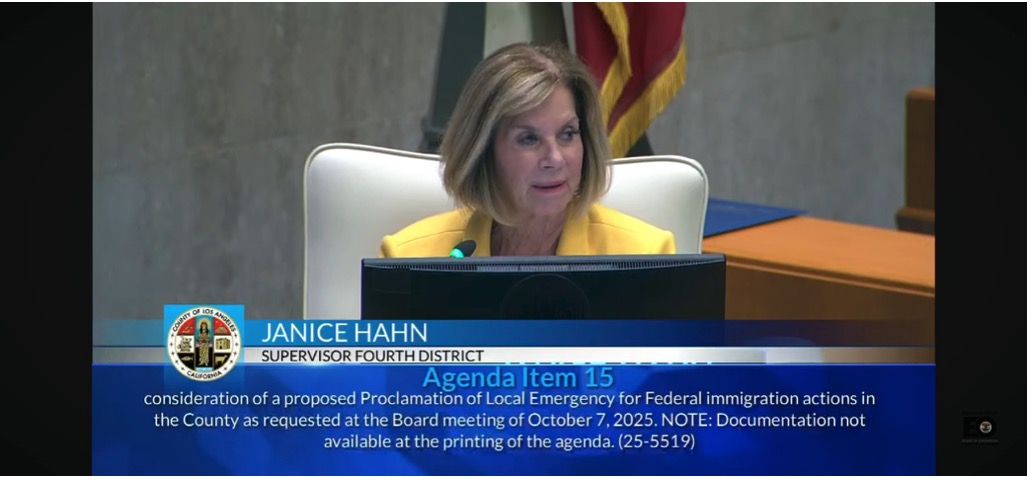
Hahn-gry about the direction of the county.
So here’s my modest contribution: an empty bag with a hole in it. It won’t hold virtue, but it might carry a few scraps of better conduct across the room before they leak out. It’s voluntary, unenforceable, and completely portable — for council meetings, school boards, commissions, podcasts, and family dinners. From a guy who’s been gaveled down, blocked from calling in, and somehow still believes in microphones.
A CIVIC CODE for any room where tempers and microphones meet.
Full Speech Rights
Say what you need to say. Anger is protected. Offense is not a crime. But remember: clarity outlasts volume.
Lead with a fact.
If you’re calling someone corrupt, show the receipt. If you’re speculating, label it speculation. If you’re wrong, fix it loud and fast.
Attack conduct, not chromosomes.
It’s fine to call a vote crooked or a deal rotten. Just don’t confuse anatomy or ancestry with argument.
Yield the floor, not the fight.
When time’s up, stop. Come back next round with better evidence and a charged battery.
Record the record-keepers.
If “decorum” gets used to shut you down, note it publicly and post the clip. Sunshine is the only enforcement we can afford.
Remember why we speak.
Not to win, not to humiliate — to make sure someone else hears what power wants buried.
(Eric Preven is a Studio City-based television writer-producer, award-winning journalist, and longtime community activist. He is known for his sharp commentary on transparency and accountability in local government. Eric successfully brought and won two landmark open government cases in California, reinforcing the public’s right to know. A regular contributor to CityWatch, he combines investigative insight with grassroots advocacy to shine a light on civic issues across Los Angeles.)












